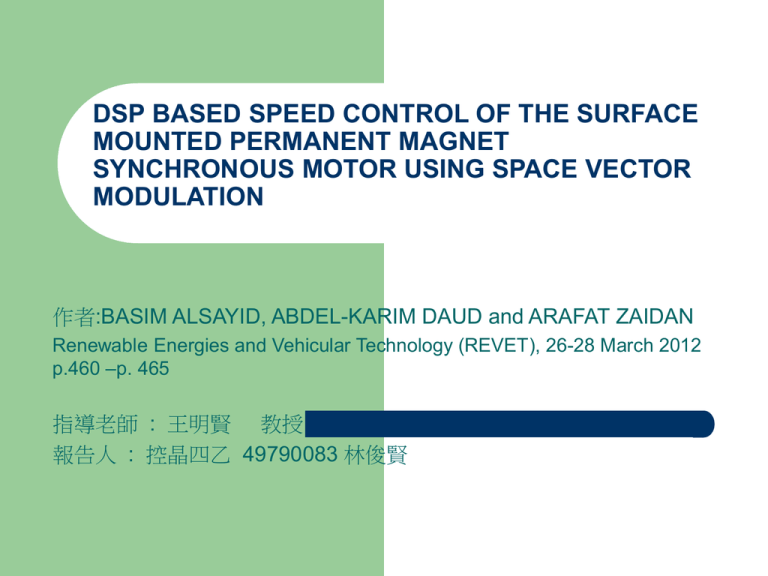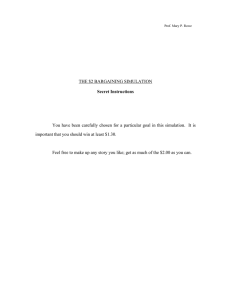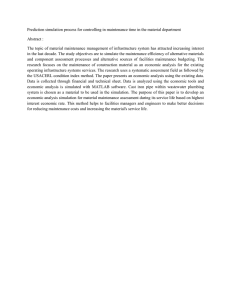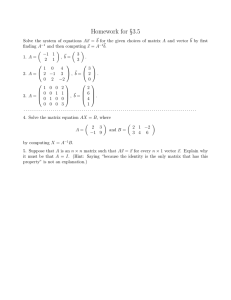
DSP BASED SPEED CONTROL OF THE SURFACE
MOUNTED PERMANENT MAGNET
SYNCHRONOUS MOTOR USING SPACE VECTOR
MODULATION
作者:BASIM ALSAYID, ABDEL-KARIM DAUD and ARAFAT ZAIDAN
Renewable Energies and Vehicular Technology (REVET), 26-28 March 2012
p.460 –p. 465
指導老師 : 王明賢 教授
報告人 : 控晶四乙 49790083 林俊賢
1-Abstract
2-Introduction
3-PMSM DRIVE SYSTEM
4-Space Vector Modulation
5-SIMULATION in SIMULINK
6-EXPERIMENTAL RESULTS
7- CONCLUSIONS
8- REFERENCES
Abstract
The field oriented vector control, that regulates the
speed of the PMSM, is provided by a quadrature
axis current command developed by the speed
controller. The simulation includes all realistic
components of the system
Abstract
This enables the calculation of currents and voltages
in different parts of the voltage source inverter (VSI)
and motor under transient and steady state
conditions.
Experimental results show that the PMSM exhibits
improved speed stability especially in very low speed
range.
Introduction
The complicated coupled nonlinear dynamic
performance of PMSM can be significantly improved
using vector control theory [3, 4, 5, 6, 7, 9, 10] where
torque and flux can be controlled separately.
Under perfect field orientation and with constant flux
operation, a simple linear relation can characterize
the torque production in the motor when the
magnetic circuit is linear [11, 12, 13, 14, 15].
Introduction
The simulation circuit will include all realistic
components of the drive system.
A closed loop control system with a PI controller in
the speed loop has been designed to operate in
constant torque region.
Simulation results are given for the speed range in
constant torque region of motor operation.
PMSM DRIVE SYSTEM
Space Vector Modulation
a logic state Si (i=a,b,c)can be defined. Si is 1 if the
upper switch is commanded to be closed and 0 if the
lower one is commanded to be close (first).
Since there are 3 independent legs there will be
eight different states so 8 different voltages.
Space Vector Modulation
Space Vector Modulation
For SVM we need the reference voltages to be in
stationary frame.
the real output currents (ia, ib,ic) from VSI have to be
transformed into the rotating frame through D/T
Transformation.
Speed controller calculates the difference between
the reference speed ( *) and the actual speed ( )
producing an error, which is fed to the PI controller.
Space Vector Modulation
Space Vector Modulation
SIMULATION in SIMULINK
calculation torque and speed, control circuit, inverter
and PMSM. The dqo variables transformation to abc
phase is built using the reverse Parks transformation.
For simulation purpose the voltages are the inputs
and the current are output.
SIMULATION in SIMULINK
SIMULATION in SIMULINK
SIMULATION in SIMULINK
SIMULATION in SIMULINK
SIMULATION in SIMULINK
EXPERIMENTAL RESULTS
Feedback signals to the controller board are the
actual motor currents and the rotor position angle.
The currents are measured by the Hall-effect
transducers.
The currents are then buffered and fed to the A/D
ports of the controller board. The motor shaft position
is measured by an optical incremental encoder
installed at the motor shaft.
EXPERIMENTAL RESULTS
The commutating signals for the drive pulses have
also been generated by the SVM.
EXPERIMENTAL RESULTS
EXPERIMENTAL RESULTS
A series of experiments has been carried out to
evaluate the performances of the proposed vector
controlled PMSM drive system using SVM.
Sample results are presented in Figures 11, 12 and
13 in this digest. Figure 11 demonstrates the actual
phase current ia wave form at 600 rpm and torque of
3.66Nm.
EXPERIMENTAL RESULTS
EXPERIMENTAL RESULTS
EXPERIMENTAL RESULTS
CONCLUSIONS
The proposed field oriented vector controlled PMSM
drive can handle the effects of step change in
reference speed and parameter variations.
Results show that the proposed control scheme
guarantees stable and robust response of the PMSM
drive, under a wide range of operating conditions.
REFERENCES
[1] M.H. Rashid, Power Electronics, Circuits, Devices and Applications, Pearson
Prentice Hall, Upper Saddle River, New Jersy, 2004.
[2] H.B. Ertan; M.Y. Üctung; R. Colyer; A. Consoli, Modern Electrical Drives, Kluwer
Academic Publishers, Netherlands, 2000.
[3] E. Hendawi; F. Khater; A. Schaltout, Analysis,Simulation and Implementation of
Space Vector Pulse Width Modulation Inverter, Proceedings of the 9th WSEAS
International Conference on APPLICATIONS of ELECTRICAL ENGINEERING,
Penang, Malaysia,March 23-25, 2010, pp. 124-131.
[4] N. Urasaki; T. Senjyu; K. Uezato, Adaptive Dead-Time Compensation Strategy
for Permanent Magnet Synchronous Motor Drive, IEEE TRANSACTIONS ON
ENERGY CONVERSION, VOL. 22, NO. 2, JUNE 2007 pp. 271-280.
[5] A.-K. Daud, Performance analysis of two phase brushless DC motor for
sensorless operation, WSEAS Transactions on Power Systems, May 2006,
Issue 5,Volume 1, pp. 802-809.
REFERENCES
[6] N. Mohan, Advance Electric Drives, Mnpere,Minneapolis, 2001.
[7] P. Pillay and R. Krishnan, Control characteristics and speed controller design of
a high performance PMSM, in Record IEEE Ind. Appl. Soc.Annu. Meeting.,
1985, pp. 627–633.
[8] W. Leonnard, Microcomputer control of high dynamic performance ac drives—a
survey, Automatica, vol. 22, pp. 1–19, 1986.
[9] C. Mademlis and N. Margaris, Loss minimization in vector-controlledinterior
permanent-magnet synchronous motor drives, Industrial Electronics, IEEE
Transactions on, vol. 49, pp. 1344-1347, 2002.
[10] X. Jian-Xin, S. K. Panda, P. Ya-Jun, L. Tong Heng, and B. H. Lam, A modular
control scheme for PMSM speed control with pulsating torque minimization,
Industrial Electronics, IEEE Transactions on, vol. 51, pp. 526-536, 2004.
[11] C.-m. Ong, Dynamic Simulation of Electric Machinery using Matlab/Simulink:
Prentice Hall, 1998.
[12] H. Macbahi, A. Ba-razzouk, J. Xu, A. Cheriti, andV. Rajagopalan, A unified
method for modeling and simulation of three phase induction motor drives,
2000.
REFERENCES
[13] B. K. Bose, Modern power electronics and AC
drives: Prentice Hall, 2002.
[14] B. Cui, J. Zhou, and Z. Ren, Modeling and
simulation of permanent magnet synchronous motor
drives, 2001.
[15] E. Arroyo, Modeling and simulation of permanentmagnet synchronous motor drive system, Master of
Science in electrical engineering UNIVERSITY OF
PUERTO RICO MAYAGÜEZ CAMPUS, 2006.
[16] G. K. Dubey, Fundamentals of electrical
drives,Alpha Science, 2001.




